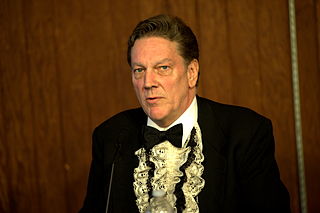A Quote by Nathaniel Hawthorne
Thus we see, too, in the world that some persons assimilate only what is ugly and evil from the same moral circumstances which supply good and beautiful results--the fragrance of celestial flowers--to the daily life of others.
Related Quotes
When you say there's too much evil in this world you assume there's good. When you assume there's good, you assume there's such a thing as a moral law on the basis of which to differentiate between good and evil. But if you assume a moral law, you must posit a moral Law Giver, but that's Who you're trying to disprove and not prove. Because if there's no moral Law Giver, there's no moral law. If there's no moral law, there's no good. If there's no good, there's no evil. What is your question?
When one has once accepted and absorbed Evil, it no longer demands the unfitness of the means. The ulterior motives with which youabsorb and assimilate Evil are not your own but those of Evil.... Evil is whatever distracts. Evil knows of the Good, but Good does not know of Evil. Knowledge of oneself is something only Evil has. One means that Evil has is the dialogue.... One cannot pay Evil in installments--and one always keeps on trying to.
There's always the same amount of good luck and bad luck in the world. If one person doesn't get the bad luck, somebody else will have to get it in their place. There's always the same amount of good and evil, too. We can't eradicate evil, we can only evict it, force it to move across town. And when evil moves, some good always goes with it. But we can never alter the ratio of good to evil. All we can do is keep things stirred up so neither good nor evil solidifies. That's when things get scary. Life is like a stew, you have to stir it frequently, or all the scum rises to the top.
The Negro who experiences bitter and agonizing circumstances as a result of some ungodly white person is tempted to look upon all white persons as evil, if he fails to look beyond his circumstances. But the minute he looks beyond his circumstances and sees the whole of the situation, he discovers that some of the most implacable and vehement advocates of racial equality are consecrated white persons.
The wrinkled man in the wheelchair with the legs wrapped, the girl with her face punctured deep with the teeth marks of a dog, the mess of the world, and I see - this, all this, is what the French call d'un beau affreux, what the Germans call hubsch-hasslich - the ugly-beautiful. That which is perceived as ugly transfigures into beautiful. What the postimpressionist painter Paul Gauguin expressed as 'Le laid peut etre beau' - The ugly can be beautiful. The dark can give birth to life; suffering can deliver grace.
Evil isn't beautiful on its own. You know?' 'Well, good people are sometimes ugly-' Blanche said at last. 'I don't know about that. Not really,' Bear shook his head. 'If the good's there, and you look for it, you'll see it in some way.' 'I think Bear is right,' Rose said decidedly. 'Fairy tales teach you that. No one who's really good ever stays ugly. It's always a disguise.
Do not be too moral. You may cheat yourself out of much life so.
Aim above morality.
Be not simply good;
be good for something.
All fables, indeed, have their morals; but the innocent enjoy the story. Let nothing come between you and the light. Respect men and brothers only. When you travel to the Celestial City, carry no letter of introduction. When you knock, ask to see God
If the Irish once find out that there are any circumstances in which they can get free government grants, we shall have a system of mendicancy [begging] such as the world never knew”. After a million had starved to death he stated “The great evil with which we have to contend is not the physical evil of the famine, but the moral evil of the selfish, perverse and turbulent character of the people.
He that would travel for the entertainment of others, should remember that the great object of remark is human life. Every Nation has something peculiar in its Manufactures, its Works of Genius, its Medicines, its Agriculture, its Customs, and its Policy. He only is a useful Traveller, who brings home something by which his country may be benefited; who procures some supply of Want, or some mitigation of Evil, which may enable his readers to compare their condition with that of others, to improve it whenever it is worse, and whenever it is better to enjoy it.
You've got to give kids really beautiful children's books in order to turn them into revolutionaries. Because if they see these beautiful things when they're young, when they grow up they'll see the real world and say, 'Why is the world so ugly?! I remember when the world was beautiful.' And then they'll fight, and they'll have a revolution. They'll fight against all of our corruption in the world, they'll fight to try to make the world more beautiful. That's the job of a good children's book illustrator.
In the story of the Creation we read: ". . . And behold, it was very good." But, in the passage where Moses reproves Israel, the verse says: "See, I have set before thee this day life and good, and death and evil." Where did the evil come from? Evil too is good. It is the lowest rung of perfect goodness. If you do good deeds, even evil will become good; but if you sin, evil will really become evil.
I see and hear daily that you of the Clergy preach one against another, teach one contrary to another, inveigh one against another without charity or discretion. Some be too stiff in their old mumpsimus, others be too busy and curious in their new sumpsimus. Thus all men almost be in variety and discord.







































